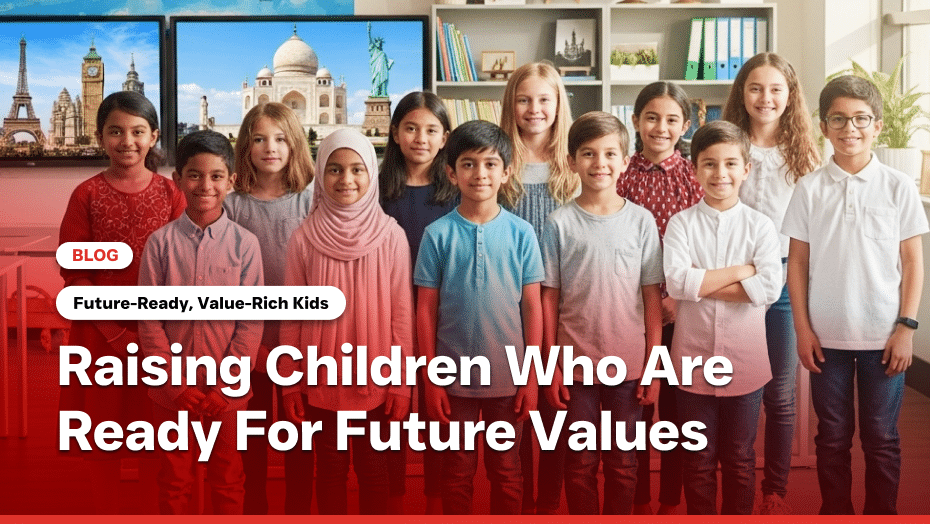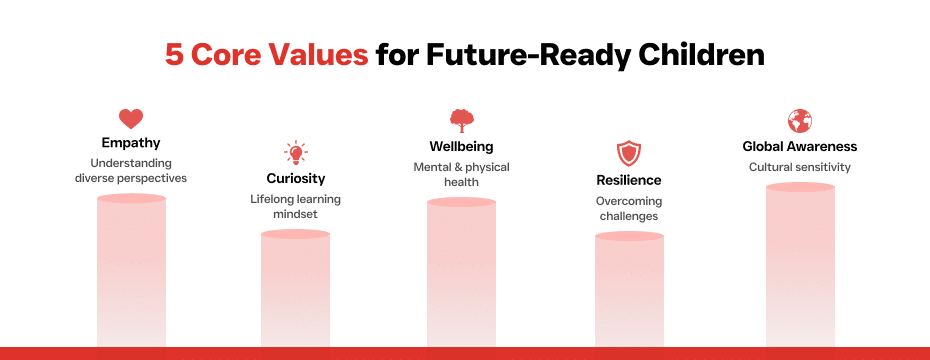Raising Future-Ready Children: Values That Matter Most in Education

In present-day learning, parents face the ever-tricky task of preparing their children for a future that looks very far from their children. This would make the typical approach, primarily focused on academics, no longer sustainable. In the modern world, education has to nurture persons who would operate well in an interconnected global society rather than simply being concerned with textbooks and test scores.
Educational values in Dubai schools are being changed to respond to marketing needs. The shift in priority has been toward emotional intelligence and critical thinking, with adaptability thrown in for good measure, alongside academics.
This blog explores the essential values that matter most in raising future-ready children. We will examine how empathy in education Dubai creates compassionate leaders, why curiosity-driven learning Dubai fuels innovation, and how wellbeing in Dubai education supports holistic development. Additionally, this parent guide will provide practical insights for raising resilient children in Dubai who can navigate tomorrow’s challenges with confidence and purpose.
What Makes a Child Truly Future-Ready?

Future-ready children possess more than just academic knowledge. They demonstrate adaptability, emotional intelligence, and the ability to think critically about complex problems. These children can collaborate effectively with people from diverse backgrounds and approach challenges with creativity and resilience.
The foundation of future readiness is developing these core values very early through the education system of a child. When children recognize the importance of respect, integrity, and perseverance, they build character, which helps them to achieve in any environment. These values become the compass by which they make their decisions for the rest of their lives.
Educational values in Dubai schools recognize that success in the 21st century requires a different skill set than previous generations. Today’s children need to be comfortable with uncertainty, capable of continuous learning, and skilled at building meaningful relationships across cultural boundaries.
How Does Empathy Shape Tomorrow's Leaders?
Empathy in education plays a crucial role in developing future leaders who can understand and connect with others. When children learn to see situations from different perspectives, they develop the emotional intelligence necessary for effective leadership and collaboration.
Empathetic children become adults who can
- Navigate diverse workplaces with cultural sensitivity
- Build strong relationships based on mutual understanding
- Resolve conflicts through dialogue and compromise
- Lead teams with compassion and awareness
- Make decisions that consider the impact on all stakeholders
Schools that prioritize empathy create learning environments where children feel safe to express themselves and learn from their mistakes. This emotional safety net encourages risk-taking and innovation, essential qualities for future success.
Building Empathy Through Daily Interactions
Empathy develops through consistent practice and modeling. Children learn to be empathetic when they see adults demonstrating understanding and compassion in their daily interactions. Simple activities like group discussions, peer mentoring, and community service projects help children practice putting themselves in others’ shoes.
Why Is Curiosity the Key to Lifelong Learning?

Curiosity-driven learning transforms education from a passive process into an active exploration of the world. When children are encouraged to ask questions and seek answers, they develop the intrinsic motivation needed for lifelong learning.
Curious children naturally
- Ask thoughtful questions about their environment
- Explore topics beyond the standard curriculum
- Connect ideas across different subjects
- Persist through challenges to find solutions
- Develop independent thinking skills
Typically, in traditional schools, curiosity is suppressed by focusing on predetermined answers rather than on encouraging questions. Future-ready education fosters this natural curiosity and directs it toward meaningful learning experiences.
Fostering Curiosity in Educational Settings
Effective curiosity-driven learning requires
Element | Description | Impact |
Open-ended questions | Questions that have multiple valid answers | Encourages creative thinking |
Hands-on experiences | Learning through experimentation and discovery | Builds practical understanding |
Real-world connections | Linking classroom learning to everyday life | Makes learning relevant and meaningful |
Student choice | Allowing children to pursue their interests | Increases engagement and ownership |
What Role Does Wellbeing Play in Academic Success?
Wellbeing in Dubai education recognizes that children cannot reach their full potential when they are stressed, anxious, or overwhelmed. Mental, physical, and emotional health directly impact a child’s ability to learn, retain information, and apply knowledge creatively.
Schools that prioritize wellbeing create environments where children can
- Develop healthy coping strategies for stress
- Build positive relationships with peers and teachers
- Maintain physical health through regular exercise and proper nutrition
- Practice mindfulness and emotional regulation
- Balance academic demands with personal interests
The Connection Between Wellbeing and Performance
Research consistently shows that children who feel emotionally secure and physically healthy perform better academically. When schools address well-being proactively, they create the conditions necessary for optimal learning and development.
Students in wellbeing-focused environments demonstrate
- Improved concentration and focus
- Better problem-solving abilities
- Enhanced creativity and innovation
- Stronger social skills
- Greater resilience in facing challenges
How Can Parents Support Future-Ready Development?
This parent guide to education in Dubai emphasizes that parents play a crucial role in developing future-ready children. The values and attitudes children develop at home significantly influence their educational experience and future success.
Parents can support their children by
Creating a Growth Mindset Environment
- Praising effort rather than innate ability
- Encouraging children to view mistakes as learning opportunities
- Modeling continuous learning and adaptation
- Celebrating progress and improvement over perfection
Encouraging Independence and Responsibility
- Giving children age-appropriate choices and responsibilities
- Teaching problem-solving skills through guided practice
- Allowing natural consequences to teach valuable lessons
- Supporting children in developing self-advocacy skills
Fostering Global Awareness
- Exposing children to diverse cultures and perspectives
- Discussing current events and global challenges
- Encouraging language learning and cultural exchange
- Teaching respect for different beliefs and traditions
What Makes Children Resilient in the Face of Challenges?
Raising resilient children Dubai requires intentional effort to build the emotional and mental strength needed to overcome obstacles. Resilient children don’t avoid difficulties; instead, they develop the skills and mindset to navigate challenges successfully.
Resilience develops through
- Experiencing manageable challenges that build confidence
- Learning from failure without fear of judgment
- Developing problem-solving skills through practice
- Building strong support networks with family and friends
- Practicing emotional regulation during difficult times
The Role of Schools in Building Resilience
Educational institutions contribute to resilience by creating supportive environments where children can take appropriate risks and learn from their experiences. This includes providing opportunities for leadership, encouraging creative expression, and teaching coping strategies for stress and disappointment.
How Do Values Transform Educational Experiences?
Values serve as the foundation for all learning experiences. When children understand and internalize core values like integrity, respect, and perseverance, these principles guide their behavior and decision-making throughout their educational journey and beyond.
Educational values in Dubai schools that prioritize character development alongside academic achievement create individuals who are not only knowledgeable but also ethical and responsible. These values help children to:
- Make positive choices even when faced with peer pressure
- Take responsibility for their actions and their impact on others
- Work collaboratively toward common goals
- Persist through difficulties with determination
- Treat others with respect and kindness
Conclusion
Raising future-ready children requires a comprehensive approach that goes beyond traditional academic focus. Parents and educators must work together to nurture these essential qualities while maintaining high academic standards. At Dhruv Global School Dubai, we understand that preparing children for the future means developing their character alongside their intellect. Our holistic approach to education integrates yogic principles, mindfulness, and empathy while maintaining academic excellence.
We create an environment where children start their day with activities they love, fostering joy in learning and personal growth.Our global and culturally sensitive approach prepares students to become confident, compassionate global citizens.
Ready to give your child a future-ready education?
Discover how Dhruv Global School Dubai can help your child develop the values and skills needed for tomorrow’s world. Contact us today to learn more about our unique approach to holistic education and schedule a visit to our campus.
